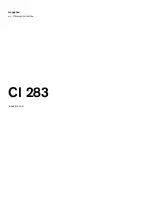
EN
26
of a pan but cover only 2/3 of its surface. This will
reduce the gas consumption and prevent the lame
from soiling the utensils.
The size of the lame depends on the position of
•
the knob (ig. 7.2.1, 7.2.2, 7.2.3). The full lame
should be used until the dish begins to boil, then
it is better to use the simmering lame. The size of
the lame should be regulated only within the range
between and Fig. 7.2.5.
- Burner switched off
- Large lame
- Small lame (simmering)
7.3 Turning the burners on
The cookers are equipped with a lame failure safe
-
ty device which cuts off the gas low to the burners
when the lame is extinguished, e.g. by overlowing
food.
push in the knob of selected burner to the maxi
-
–
mum, turn it in the counter-clockwise direction,
set it in position and keep it pressed until the
lame appears,
after the burner lights release the press on the
–
knob; the burner should remain lit,
when the burner has lit keep the knob pressed
–
for ca. 5s more for the lame failure device to be
-
come activated,
if the lame goes out repeat the activities descri
-
–
bed above but keep the knob pressed for ca. 5s
longer,
set the required size of the lame.
–
If the lame has accidentally extinguished, close
the gas low and wait for at least 1 minute before
retrying to reignite the burner.
7.4 Turning the burners off
to turn off the burners, turn the knobs clockwise to
–
zero position.
7.5 Hobs supplied from a LPG cylinder
Before lighting the irst burner, open the valve on the
LPG cylinder. Then light the burner using the method
described above.
When closing the low of gas before turning off the
last burner:
close the valve on the LPG cylinder,
–
when the lame has gone out, close the tap of that
–
burner.
When the hob is not used the valve of the LPG cylin
-
der should be closed.
7.6 Choice of utensils
Pots used for cooking on the hob should not be
•
too tall, ideally their height should equal 2/3 of the
diameter of their bottom.
Utensils should be always clean and dry as they
•
will then conduct and retain heat well.
During cooking, pan lids should be used, which will
•
prevent the excess of odours from accumulating in
the kitchen.
Minimum diameters of pans for each type of bur
-
•
ner:
for a small burner
-
f
90 mm
for a medium burner
-
f
120 mm
for a large burner
-
f
140 mm
for a three crown burner
-
f
180 mm
Warning !
Before cleaning the appliance switch off the hob
at the mains supply.
8.1 Cleaning glass hobs
Before cleaning the hob remove pan supports and
•
top elements of burners.
Put dirty pan supports in warm soapy water for
•
some time, then wash and dry them.
Knobs cleaning with mild liquid, not containing
•
abrasives.
Glass hob cleaned regularly, after each use. Use
•
only the funds allocated to the glass ceramic. Ob
-
serve the manufacturer’s instructions, given on the
package.
Universal lotions and milks are unsuitable for cle
-
•
aning glass hob, it leaves streaks and spots.
To clean the glass plate of coarse not use abrasi
-
•
ve surfaces, wire sponges, harsh chemicals and
sharp objects, cleaning equipment or steam under
pressure, and products intended for use in a dish
-
washer or oven cleaners.
Do not clean glass surfaces using any abrasive
•
agents or metal items, as they may scratch the sur
-
face and cause the glass to break.
If the glass surface is not singed, it should be wi
-
•
ped with a soft damp microibre cloth. However,
you can clean the burnt disc special plastic or me
-
tal scraper to the ceramic plates. Then wipe the
surface with a damp cloth.
The hob surface around burners should always be
•
clean as dirt deteriorates the combustion of gas.
Summary of Contents for 2CMI-4GLST
Page 2: ...1 ...
Page 5: ...4 7 2 2 7 6 1 7 6 2 7 2 4 7 2 1 7 2 3 8 2 1 8 1 1 8 2 2 8 2 3 7 3 1 ...
Page 15: ...RU 14 6 7 8 9 10 11 ...
Page 20: ...RU 19 o p CERA FIX 8 1 1 8 2 8 2 1 1 4 2 5 3 6 8 2 2 8 2 3 9 1 1 9 1 2 9 1 1 9 1 2 ...
Page 21: ...RU 20 ...
Page 22: ...RU 21 2002 96 ...
Page 31: ...EN 30 ...






































